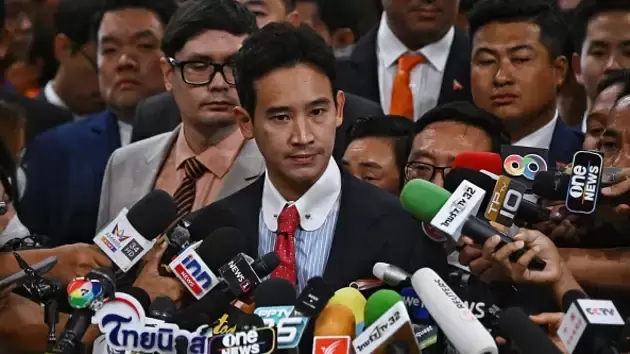Thailand's Pita Limjaroenrat is facing another opportunity to become the country's prime minister next week, but the path to power remains uncertain. The leader of the Move Forward Party has pledged to amend a law that prohibits criticism of the monarchy, but this stance has caused deep divisions and mistrust among conservative royalists in the Senate. In the first parliamentary vote, Limjaroenrat fell 51 votes short of the majority needed to secure the top job. The outcome highlights the risk of prolonged political turmoil and the potential for large-scale protests if a new government is not formed promptly.
The next vote is tentatively scheduled for Wednesday, and Limjaroenrat will have another chance to stand for prime minister if nominated by his eight-party alliance. Alternatively, the Pheu Thai party, the second-largest party in the coalition, may put forward its own candidate from a list of three potential contenders. These candidates include Paetongtarn Shinawatra, the daughter of exiled former Prime Minister Thaksin Shinawatra; former property tycoon Srettha Thavisin, and Chaikasem Nitisiri, the party's chief of strategy and political direction.
The major point of contention between the Move Forward Party and conservative royalists is the proposed amendment to Article 112, known as the lèse-majesté law, which criminalizes criticism of the monarchy. Move Forward intends to revise certain parts of the law to prevent its abuse as a political tool, but many senators object to any changes, fearing the complete dismantling of the law. The proposed amendments include reducing the maximum prison sentence for defamation of the king to one year and six months for the queen, heir, or regent.
The younger generation in Thailand is disenchanted with the country's royalist military establishment, especially due to the use of the lèse-majesté law against young protesters in 2020. The law was invoked in around 250 out of 1,914 prosecutions related to the 2020 protests, with many cases involving minors. Limjaroenrat acknowledged the pressure and incentives influencing the senators' votes and expressed his intention to convince them to follow the will of the people.
To further complicate matters, Move Forward Party lawmakers have proposed an amendment to bar junta-appointed senators from participating in the subsequent vote for prime minister. However, this amendment faces significant hurdles, requiring approval from one-third of senators and support from opposition parties.
Move Forward Party campaigned on an ambitious agenda of structural reforms targeting the monarchy, monopolies, and military. Their surprising majority in the May elections, along with the Pheu Thai Party, represented a significant shift in power away from conservative politicians who had dominated during nine years of military rule. However, their slim majority has made it challenging to implement their reform agenda and navigate the complexities of the institutions they seek to change.
The uncertainty surrounding Limjaroenrat's qualifications and the constitutionality of Move Forward's policy on amending the lèse-majesté law remain key risks. The constitutional court received a fresh complaint accusing Move Forward's plans of "overthrowing a democratic government" by reforming the law. The court is also considering disqualifying Limjaroenrat as a member of parliament due to a violation of electoral rules. These developments mirror the events that led to the dissolution of the Future Forward Party, including the disqualification of its leader, Thanathorn Juangroongruangkit.
Analysts express skepticism that anything will change and predict a similar fate for Limjaroenrat as his predecessors. The outcome of the upcoming vote and the court's rulings will determine the future political landscape in Thailand and the fate of the proposed reforms.
The next vote is tentatively scheduled for Wednesday, and Limjaroenrat will have another chance to stand for prime minister if nominated by his eight-party alliance. Alternatively, the Pheu Thai party, the second-largest party in the coalition, may put forward its own candidate from a list of three potential contenders. These candidates include Paetongtarn Shinawatra, the daughter of exiled former Prime Minister Thaksin Shinawatra; former property tycoon Srettha Thavisin, and Chaikasem Nitisiri, the party's chief of strategy and political direction.
The major point of contention between the Move Forward Party and conservative royalists is the proposed amendment to Article 112, known as the lèse-majesté law, which criminalizes criticism of the monarchy. Move Forward intends to revise certain parts of the law to prevent its abuse as a political tool, but many senators object to any changes, fearing the complete dismantling of the law. The proposed amendments include reducing the maximum prison sentence for defamation of the king to one year and six months for the queen, heir, or regent.
The younger generation in Thailand is disenchanted with the country's royalist military establishment, especially due to the use of the lèse-majesté law against young protesters in 2020. The law was invoked in around 250 out of 1,914 prosecutions related to the 2020 protests, with many cases involving minors. Limjaroenrat acknowledged the pressure and incentives influencing the senators' votes and expressed his intention to convince them to follow the will of the people.
To further complicate matters, Move Forward Party lawmakers have proposed an amendment to bar junta-appointed senators from participating in the subsequent vote for prime minister. However, this amendment faces significant hurdles, requiring approval from one-third of senators and support from opposition parties.
Move Forward Party campaigned on an ambitious agenda of structural reforms targeting the monarchy, monopolies, and military. Their surprising majority in the May elections, along with the Pheu Thai Party, represented a significant shift in power away from conservative politicians who had dominated during nine years of military rule. However, their slim majority has made it challenging to implement their reform agenda and navigate the complexities of the institutions they seek to change.
The uncertainty surrounding Limjaroenrat's qualifications and the constitutionality of Move Forward's policy on amending the lèse-majesté law remain key risks. The constitutional court received a fresh complaint accusing Move Forward's plans of "overthrowing a democratic government" by reforming the law. The court is also considering disqualifying Limjaroenrat as a member of parliament due to a violation of electoral rules. These developments mirror the events that led to the dissolution of the Future Forward Party, including the disqualification of its leader, Thanathorn Juangroongruangkit.
Analysts express skepticism that anything will change and predict a similar fate for Limjaroenrat as his predecessors. The outcome of the upcoming vote and the court's rulings will determine the future political landscape in Thailand and the fate of the proposed reforms.





